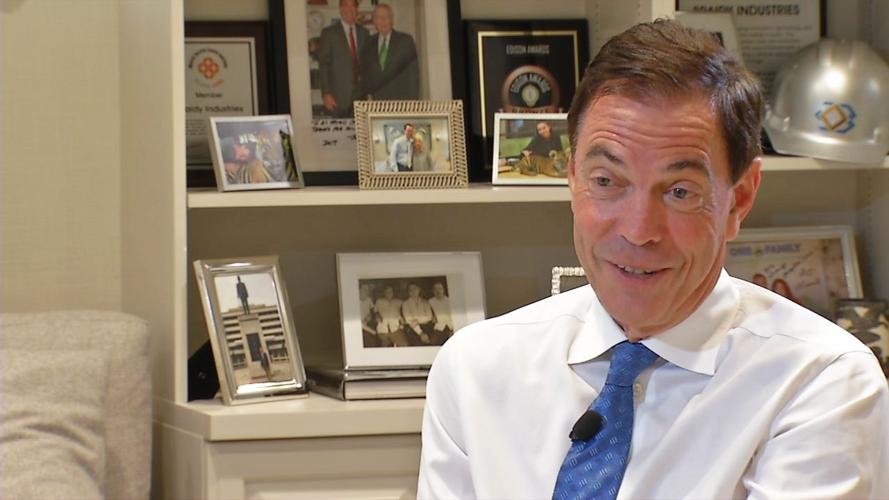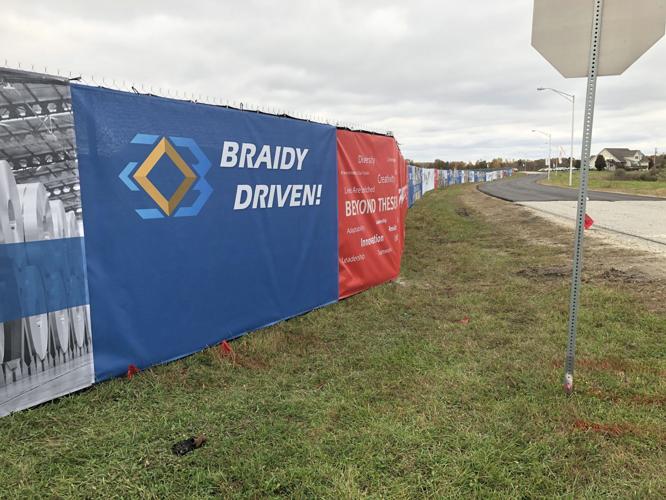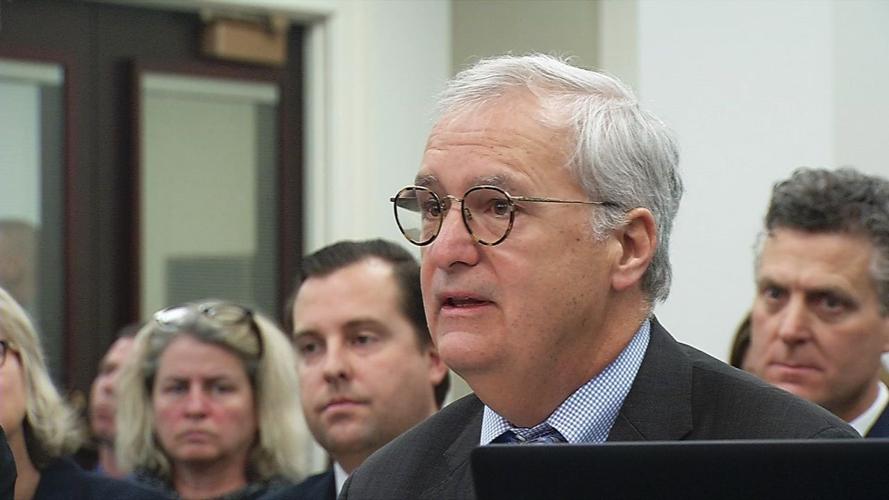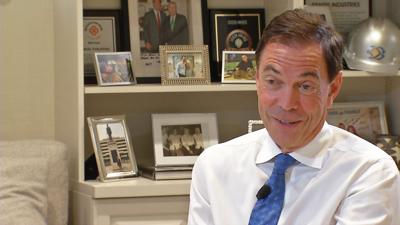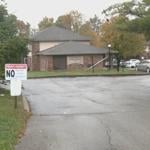LOUISVILLE, Ky. (WDRB) – Braidy Industries Inc. founder and former CEO Craig Bouchard misled the company’s board members about the funding status of a planned $1.7 billion aluminum mill planned outside of Ashland, Ky., going so far as to order documents altered to falsely portray investor interest in the project, according to an investigation commissioned by the company.
The investigation also accuses Bouchard of hiding a potential $600 million cost overrun in the project; ordering the sudden mass-deletion of company emails on false pretenses; and wasting money on public relations gambits like the “fake groundbreaking” ceremony that former Gov. Matt Bevin and hundreds of others attended at the aluminum mill site in 2018.
The report also says Bouchard had the company spend $100,000 on an opaque-boarded fence to obscure the empty field where no construction had begun and publicly promise to hire 15 community college graduates – a pledge Braidy would later rescind – all in an attempt to influence one or more reporters visiting Ashland for stories on the company last fall.
Meanwhile, Bouchard made little progress landing the big investors needed to get the aluminum plant off the ground, and the company’s other board members fired him in January shortly after they realized Braidy Industries had only $11 million on hand and was on track to “run out of money” by June, according to the report.
(To be sure, the report omits cash parked in a subsidiary company Braidy Industries established to oversee the aluminum plant, which would bring the total cash to about $65 million, as the company’s current CEO testified in February.)
The report, which Bouchard disputes, claims to draw on interviews with 26 individuals, mostly current or former employees and board members, and a review of 17,000 documents.
Bouchard was once viewed a “visionary entrepreneur,” the report concludes, but the company’s other board members and “nearly all” of its employees eventually “lost faith” in him. The report says those people still believe in the project, however.
“Bouchard originally displayed transparency, teamwork, and collaboration. But with time, he became more secretive, less team-oriented, more dictatorial, and focused on public image over reality,” the report says.
The report’s sources, which did not include Bouchard and a handful of former employees aligned with him, said Braidy Industries’ fundraising for the Ashland project withered amid Bouchard’s “shifting strategies.”
Bouchard suggested the company might move the aluminum mill to Mexico or attempt to swallow an unnamed European automotive and aerospace conglomerate with more than 50,000 employees, among other detours from the core plan, the report charges.
First publicized Saturday by the Daily Independent in Ashland, the report is part of a legal battle between Bouchard and the company’s other board members and early investors, which is playing out in the Chancery Court of Delaware.
Those early investors include Kentucky state government, which, under Bevin, provided $15 million of the first $20 million that Braidy Industries raised in 2017.
Bouchard, of Naples, Florida, is suing to regain control of the company following his ouster. He says he can replace the other board members – whom he handpicked in 2017 -- at any time under a contractual agreement between the company’s initial investors.
The other board members, who now control Braidy Industries, say Bouchard’s conduct justifies his firing and their refusal to comply with his demand to vote in new board members.
The report, completed by Louisville’s Frost Brown Todd law firm on behalf of the Braidy board, was filed in redacted form – blacking out many names, dates and other details – in the Delaware court on April 14.
In an email to WDRB on Monday, Bouchard said he “vigorously disagree(s) with the findings and conclusions set forth in that report” and characterized it as an after-the-fact justification by the other board members for their refusal to honor his right to control the board.
If the case goes to trial in Delaware, Bouchard said, “I am confident that each of the assertions in that report will be proven to be false, unsupported, and/or entirely misleading.”
Bouchard shot back at the company in a Facebook post on Tuesday.
Bouchard’s lawyers have asked the Delaware judge to rule that he has the right to control the board regardless of the other directors’ allegations about how he ran the company.
In the report, the Frost Brown Todd investigators say a second examination focusing on Bouchard’s use of money is forthcoming.
The company has already accused him of misusing company money while traveling around the world to drum up investments in Braidy Industries. Bouchard disputes misusing company money and has secured an affidavit from the company’s former controller supporting him.
‘Unfounded promises of imminent investment’
The report says board members eventually noticed a pattern in which Bouchard would promise them that he was close to landing big investors in the Braidy aluminum mill, but those investments would not materialize.
“Braidy Directors and employees recalled Mr. Bouchard stating at various times, for example, that Braidy had ‘sure’ or ‘imminent’ investments from investors in Brunei, Japan, Abu Dhabi, Saudi Arabia, Oman, South Korea, and India; yet not one of them came to fruition,” the report says. “They did not invest.”
Rusal, the Russian aluminum giant, committed up to $200 million to the Ashland mill in April 2019 contingent on Braidy Industries securing another $300 million from other investors.
That did not happen under Bouchard, despite his having approached more than 100 others, according to the report.
By January, board members did not trust Bouchard when he said he had investors lined up.
“Most of the Braidy Board and management team shared their belief that Mr. Bouchard intentionally misled the Board,” the report says. “A minority, however, believed instead that Mr. Bouchard was an overly optimistic person, even where no reasonable basis existed for optimism.”
Following a Jan. 16 meeting in which board members confronted Bouchard about the lack fundraising progress, according to the report, Bouchard emailed a Braidy Industries executive: “Our directors are wimps. I basically told them so today. We will succeed.”
Braidy Industries maintained an internal document that tracked investor interest in the project, which was periodically shown to the board. According to the report, Bouchard ordered the person who maintained the “funding tracker” document to make changes, “suggesting more positive investor interest than existed.”
The changes resulted in an estimated 70% of the information in the internal tracker being unreliable by the end of Bouchard’s tenure, according to the report.
As of February, Braidy Industries was still $500 million short of the investor money needed to finance the construction of the mill, the company told Kentucky lawmakers at a hearing shortly after Bouchard’s ouster.
Tom Modrowski, the former interim CEO of Braidy Industries, testifies in Frankfort on Feb. 11, 2020.
Tom Modrowski, whom the board elevated to CEO following Bouchard’s ouster, said at the hearing the company had $65 million in the bank. The report, however, says the company had only $11 million as of January and had been on track to run out of money by June.
Kaylee Price, a spokeswoman for the company, told WDRB the $11 million referenced in the report is the cash at Braidy Industries, the parent company, and not at Braidy Atlas, the subsidiary formed for the mill project.
Rusal and Braidy Industries would each have stakes in Braidy Atlas if the mill is built.
While the mill project languished, the report says Bouchard entertained “shifting strategies” that only detracted from the fundraising effort.
“At various times, Mr. Bouchard told possible investors and employees that Braidy would be or was considering building mills in other states, moving the Braidy Atlas Mill from Ashland to Mexico, building or acquiring additional mills in Saudi Arabia or other countries, and/or buying a multi-billion-dollar European automotive and aerospace conglomerate that had more than 50,000 employees,” the report says, without naming the European company.
The report also accuses Bouchard of hiding from the board that the general contractor for the Ashland project had told Braidy Industries it would cost $600 million more than estimated, an increase that could have been fatal to the plan.
Kiewit, the contractor, told Braidy’s Modrowski about the cost increase, who delivered the information to Bouchard.
“Mr. Bouchard responded by directing Mr. Modrowski not to send any emails about Kiewit’s new verbal cost estimate,” the report claims. “Mr. Modrowski interpreted the instruction not to put anything in writing as an effort to avoid creating a paper trail.”
But Kiewit would eventually back down from the cost increase, according to the report.
The report also accuses Bouchard of monitoring subordinates’ emails and “punishing disloyalty,” including the October 2019 firing of Blaine Holt, the company’s chief operating officer.
On the morning of Oct. 18, Bouchard’s assistant sent Bouchard an image of an email in which Holt told an outside contact that Bouchard was “a very foolish and greedy man.” Bouchard fired Holt later that day, according to the report.
Also in 2019, though many details are blacked out, Bouchard unilaterally ordered the deletion of all company emails older than six months against the advice of lawyers and without warning employees, some of whom lost important messages, according to the report.
“Ample evidence supports a conclusion that he did this to destroy emails that he felt may be harmful to him personally or to Braidy,” the report says.
Constructing a ‘Potemkin village’ in Ashland
The report accuses Bouchard of wasting money and harming the company’s reputation through public relations gambits that were ineffective or would even backfire.
“Bouchard orchestrated unnecessary schemes to construct a Potemkin village around the Ashland Mill to give a false appearance of active construction that did not exist,” the report says.
These “schemes” included a ceremonial groundbreaking ceremony for the aluminum plant in 2018, which Bevin and several other elected officials attended, although construction wasn’t close to beginning.
“What we see around us with this equipment and freshly turned dirt, this is what hope looks like,” Bevin said during the event.
The report says “thousands of people” were there. “The fake groundbreaking caused angst and frustration, as it appeared designed merely for media purposes,” it says.
Bouchard engaged in other ploys, according to the report, to influence Louisville-based reporters who were planning trips to Ashland to document the progress the mill project in late 2019.
While the report does not name those journalists, WDRB visited Ashland for an interview with Bouchard on Nov. 5, 2019. The Courier-Journal also visited Ashland ahead of a story published on Dec. 30, 2019.
A fence that cost more than $100,000 was erected in late 2019 around the site where the company formerly called Braidy Industries hoped to bui…
In the fall of 2019, Bouchard ordered the erection of an opaque, “unnecessary” fence around the empty mill site at a cost of more than $100,000, the report says.
“A Louisville-based reporter would be coming to Ashland, and Mr. Bouchard said that a fence needed to go up immediately,” according to the report. “Multiple employees believed the action to be fundamentally dishonest. In their view, the fence had no purpose other than to make it appear that the Mill was being built (when it was not), and to leave the reporter with the misimpression that Mill construction work had begun (when it had not).”
Bouchard also had public relations in mind when the company announced it would hire 15 students from the first class of the two-year Ashland community college program that Braidy Industries had helped establish, although the mill didn’t exist and there were no jobs for them, the report charges.
Bouchard ignored the objections of Braidy Industries’ human resources vice president, who hadn’t budgeted for the hires and argued that the students would realize the real motivation for the promised jobs, according to the report.
“The students are very sharp and will see that this is very likely tied to media and the election as opposed to (a) business decision,” the human resources head, Curtis Carlson, told Bouchard in email, according to the report. “We are creating turmoil in the very population that we are trying to stabilize. They have been our best supporters.”
Carlson was evidently referring the Nov. 5, 2019 election in which Bevin, a Republican who led the state’s unusual, direct infusion of $15 million into Braidy Industries, was in a close race with Democrat Andy Beshear. Beshear prevailed by a narrow margin.
In an Oct. 17 email, the report says, Bouchard ordered that the plan proceed so some of the students could be made available to the media: “I want 5 of them being interviewed by [the Louisville reporter] on November 5. . . . There are no participation trophies. It’s a tough world out there.”
Braidy Industries arranged for five students who had been promised jobs to be at Ashland Community & Technical College when WDRB toured the program on Nov. 5.
After Bouchard was ousted, Braidy Industries “did the inevitable,” according to the report, and reneged on its offer of employment to the students following their scheduled graduation from the two-year program next month.
“The failed promise of Braidy to employ the 15 students caused the company embarrassment and reputational harm,” the report says.
Bouchard, for his part, wrote on Facebook that Braidy Industries has run off all its executives with knowledge of the aluminum industry, putting the mill in doubt. He added that he was on track to raise the money needed for the project before he was fired.
“To suggest this Board can raise $1.8 billion to build the aluminum mill with no senior executives that have ever worked in an aluminum company is not credible … The actions of the Board have irreparably damaged the company and the future of 30,000 families in Appalachia,” Bouchard said in the post. “The funding of the mill was in direct line of sight when I departed. I sincerely hope I can return and minimize the damage they have done to the community, the (community college) students, and the company.”
